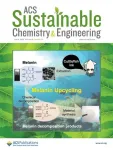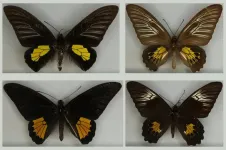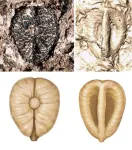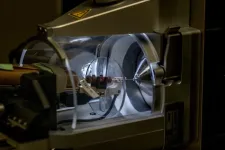(Press-News.org) FOR IMMEDIATE RELEASE
1 July 2024
The Geological Society of America
Release No. 24-06
Contact: Jason Elkins
+1-303-357-1026
jelkins@geosociety.org
Boulder, Colo., USA: The Geological Society of America (GSA) is excited to announce a significant reduction in membership fees for students. Effective 1 July 2024, undergraduate and graduate students majoring in geology or related sciences can sign up for an annual student membership for just $25. This initiative underscores GSA's commitment to supporting the next generation of geoscientists by making membership more accessible and affordable.
The reduction in student membership dues aims to foster greater inclusion and participation among students in the geosciences. By mitigating financial barriers, GSA hopes to encourage more students to take advantage of the numerous benefits and resources offered by the Society.
Unchanged Student Benefits
Student members will continue to enjoy the full suite of benefits provided by GSA. Key benefits include:
GeoCareers: This program provides students with essential career resources, including job listings, career guidance, and networking opportunities. GeoCareers supports students in charting successful geoscience career paths.
Mentoring365: This year-round mentoring program connects students with experienced geoscience professionals. Mentoring365 facilitates guidance, advice, and support to help students achieve their academic and career goals.
Access to GSA’s Premier Journals: Student members will continue to receive free access to GSA's prestigious journals, including Geology and GSA Bulletin. These journals are renowned for their high-quality research and are essential resources for geoscience students and professionals alike.
GSA’s Commitment to Education and Professional Growth
GSA has a long-standing commitment to supporting education and professional development in the geosciences. By lowering membership dues, GSA is taking a proactive step to ensure that more students can benefit from the society’s offerings without financial burden.
GSA invites all eligible students to take advantage of this reduced membership rate. Joining GSA provides students with invaluable opportunities for learning, networking, and professional growth. For more information on how to become a member and to learn more about the benefits offered, please visit www.geosociety.org.
About the Geological Society of America
The Geological Society of America (GSA) is a global professional society with a membership of more than 17,000 individuals in over 100 countries. GSA serves as a leading voice for the geosciences, promoting the understanding of Earth's dynamic processes and fostering collaboration among scientists, educators, and policymakers.
###
END
Geological Society of America reduces student membership dues to $25
2024-07-01
ELSE PRESS RELEASES FROM THIS DATE:
Melanin from cuttlefish ink as a sustainable biomass resource
2024-07-01
Every year, the negative effects of human activities on the environment become increasingly clear. From climate change and microplastics to the endangerment and extinction of countless species, it is evident that we need to find new ways to achieve sustainability. Fortunately, many research groups in prominent fields like chemistry and materials science are tirelessly working to develop solutions to get us closer to circular and sustainable economies.
One area that has attracted much attention in this regard is biomass upcycling. It refers to the transformation of naturally available organic materials into ...
AI-powered study explores under-studied female evolution
2024-07-01
Pioneering AI-powered research on butterflies has probed the under-studied evolution of females and adds to a debate between the founding fathers of evolution.
The University of Essex study – published in Communications Biology – explores a controversy between Victorian scientists Charles Darwin and Alfred Russel Wallace.
Darwin thought males had more variation, as females often chose mates based on male appearance.
Whereas Wallace thought natural selection across sexes was the biggest factor in difference.
For over a century, scientists ...
New findings may fix the replicability crisis in microbiome research
2024-07-01
Our bodies are inhabited by trillions of microorganisms, with specific microbes unique to each individual. Through experimentation, scientists have pinpointed certain factors that account for variation in the gut: diet, living conditions, exercise and maternal line. Now, scientists at University of California San Diego have discovered another factor that affects the composition of the gut microbiome: time of day. In fact, the scientists have found that time of day is such an important factor that they’re calling on the National Institutes of Health (NIH) to require researchers ...
Nanorobot with hidden weapon kills cancer cells
2024-07-01
Researchers at Karolinska Institutet in Sweden have developed nanorobots that kill cancer cells in mice. The robot’s weapon is hidden in a nanostructure and is exposed only in the tumour microenvironment, sparing healthy cells. The study is published in the journal Nature Nanotechnology.
The research group at Karolinska Institutet has previously developed structures that can organise so-called death receptors on the surface of cells, leading to cell death. The structures exhibit six peptides (amino acid chains) assembled in a hexagonal pattern.
“This hexagonal nanopattern of peptides becomes a lethal weapon,” explains Professor ...
Largest ever genetic study of age of puberty in girls shows links with weight gain
2024-07-01
Genes can indirectly influence the age at which girls have their first period by accelerating weight gain in childhood, a known risk factor for early puberty, a Cambridge-led study has found. Other genes can directly affect age of puberty, some with profound effects.
In the largest study of its kind to date, an international team led by researchers at the Medical Research Council (MRC) Epidemiology Unit, University of Cambridge, studied the DNA of around 800,000 women from Europe, North America, China, Japan, and Korea.
Published today in Nature Genetics, the researchers found more than 1,000 variants – small changes in DNA – that ...
Sixty-million-year-old grape seeds reveal how the death of the dinosaurs may have paved the way for grapes to spread
2024-07-01
If you’ve ever snacked on raisins or enjoyed a glass of wine, you may, in part, have the extinction of the dinosaurs to thank for it. In a discovery described in the journal Nature Plants, researchers found fossil grape seeds that range from 60 to 19 million years old in Colombia, Panama, and Peru. One of these species represents the earliest known example of plants from the grape family in the Western Hemisphere. These fossil seeds help show how the grape family spread in the years following the death of the dinosaurs.
“These are the oldest grapes ever found in this part of the world, and they’re a few million years ...
AI model finds the cancer clues at lightning speed
2024-07-01
Researchers at the University of Gothenburg have developed an AI model that increases the potential for detecting cancer through sugar analyses. The AI model is faster and better at finding abnormalities than the current semi-manual method.
Glycans, or structures of sugar molecules in our cells, can be measured by mass spectrometry. One important use is that the structures can indicate different forms of cancer in the cells.
However, the data from the mass spectrometer measurement must be carefully analysed by humans to work out the structure from the glycan fragmentation. This process can take anywhere from hours ...
Individuals can tell if their memories are trustworthy, new study shows
2024-07-01
How much trust should we put in our memories? New research shows we have a good awareness of when we are recalling events accurately – and when our brain is filling in gaps with general knowledge.
Memories are a blend of recalled details and ‘prototypical’ information, but a study at the University of Birmingham has shown that when prototypes appear more prominent, we become less confident in the recollection.
This means that we are able to distinguish between these two types of memory, and accurately assess how ...
Palliative care beneficial to manage symptoms, improve quality of life for people with CVD
2024-07-01
Statement Highlights:
Palliative medication management focuses on providing relief from symptoms and enhancing quality of life for people with cardiovascular disease throughout the various stages of the disease.
Decisions about initiating, adjusting or discontinuing cardiovascular and other medicines should be patient-centered and include input from multiple specialties including cardiology experts in close collaboration with primary care professionals.
Evidence shows that adding palliative care interventions to standard cardiovascular ...
How researchers are using digital city-building games to shape the future
2024-07-01
Lancaster University researchers have come up with exciting and sophisticated new mapping technology enabling future generations to get involved in creating their own future built landscape.
They say, in their new research published today, that planners are missing a real trick when it comes to encouraging and involving the public to help shape their own towns, cities and counties for the future.
They also say that games platforms can be used to plan future cities and also help the public immerse themselves in these future worlds.
The researchers have modified Colossal Order’s game ‘Cities: Skylines’ ...



